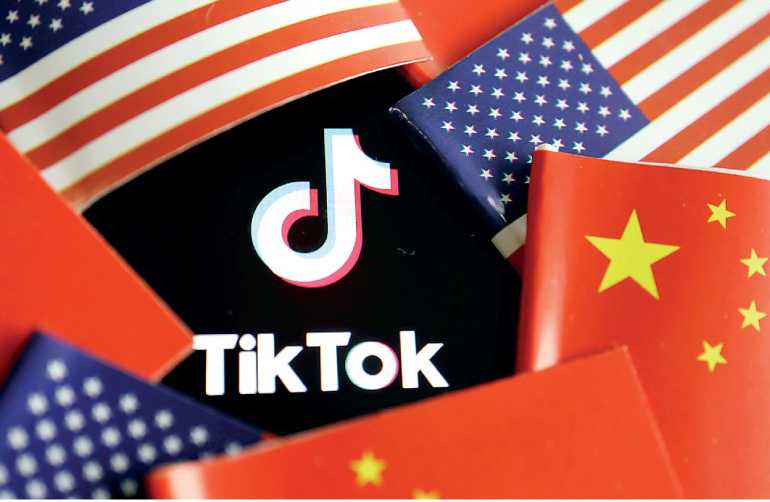Tuesday Feb 17, 2026
Tuesday Feb 17, 2026
Wednesday, 5 August 2020 02:03 - - {{hitsCtrl.values.hits}}

TikTok’s roller-coaster ride in the US continued on Monday, as President Donald Trump said he would approve the video-sharing app’s sale to Microsoft only if the US government gets a cut, a condition that one expert called a “mafia” deal.
The increased scrutiny into TikTok culminated on Friday when Trump threatened to ban the app, owned by Chinese company ByteDance, from operating in the US due to a “national security risk”. The negotiation between the two companies was then halted.
But after a weekend phone call with Microsoft CEO Satya Nadella, Trump reversed his stance and reportedly gave the two companies 45 days to close the deal. It was confirmed by Microsoft on Sunday, which said in a statement it “will move quickly to pursue discussions” with ByteDance and complete the talks “no later than” 15 September.
The president on Monday added a condition to the potential purchase: Microsoft should buy TikTok outright, and the US Treasury Department should be paid because it is the government that will have made the deal possible.
“It’s a little bit like the landlord/tenant; without a lease the tenant has nothing, so they pay what’s called ‘key money,’ or they pay something,” Trump told reporters in the Cabinet Room at the White House on Monday.
“But the United States should be reimbursed or should be paid a substantial amount of money, because without the United States, they don’t have anything, at least having to do with the 30 percent.” The president also gave the two companies a deadline of 15 September, to complete the deal, or the app will be banned in the US.
Investors of the privately owned ByteDance valued TikTok at $50 billion, according to a Reuters report last week. The legal basis of Trump’s requirement that some of the money from the deal go to the US Treasury was immediately questioned by experts. “This is quite unusual; this is out of the norm,” US Department of Justice’s Antitrust Division former chief counsel Gene Kimmelman, told CNN.
“It’s actually quite hard to understand what the president is actually talking about here. ... It’s not unheard of for transactions to have broader geopolitical implications between countries, but it’s quite remarkable to think about some kind of money being on the table in connection with a transaction,” said Kimmelman, a senior adviser to the policy group Public Knowledge.
Cato Institute senior fellow Julian Sanchez said Trump’s “extortion threat” is a “mafia business model”.
“Trump’s full explanation of why Treasury should get a ‘cut’ of a Microsoft/TikTok deal is, somehow, even more grotesque and shameless than I had anticipated,” said Sanchez.
“As with his tariff policy, there doesn’t seem to be any consideration of whether this sets a dangerous precedent for other countries to engage in similar pretextual protectionism against us, or how whimsically compelling divestment might affect international investment,” he said.
Yale Law School’s Paul Tsai China Centre senior fellow Samm Sacks also warned that shutting down the app altogether would set “a dangerous precedent in which the US government can blacklist companies based on country of origin using blanket national security as justification”.
The Trump administration has been scrutinising TikTok for several months, claiming that the platform shares the data of American users with the Chinese government. The company has repeatedly denied the accusations, maintaining that all the users’ information is stored in the US.
US Secretary of State Mike Pompeo said in an interview with Fox News on Sunday that Trump will take action shortly on Chinese software companies, while making a claim that these companies feed data directly to the Chinese government and pose a risk to US national security.
The Trump administration’s basis for “casually threatening to shut down an expressive platform used by millions of people is completely speculative,” said Sanchez.
The American Civil Liberties Union (ACLU) called on the US Congress to legislate to ensure that any company that provide a service to American consumers cannot hand over data to any government without a warrant or equivalent. “Letting the president selectively ban platforms isn’t the solution,” said the organisation.
TikTok, known for its dancing and lip-sync videos, has become wildly popular among young adults in the US. In less than four years, the company has had around 100 million users in the US and hundreds of millions worldwide. TikTok said in a statement Monday that the app is still focused on the long term, without mentioning the potential Microsoft deal or Trump’s recent comments.
While seeking fair and open competition, TikTok CEO Kevin Mayer, in his blog post, called out Facebook for “maligning attacks disguised as patriotism”. TikTok’s rapid growth makes it a major competitor of Facebook, which owns social media app Instagram. Facebook CEO Mark Zuckerberg has publicly questioned TikTok’s connection to the Chinese government over issues of censorship.
Zuckerberg used last week’s congressional hearing on Big Tech’s business practices to describe his competition with TikTok as an ideological battle. In his prepared speech, he stressed the values of democracy, competition, inclusion and free expression while expressing worries that China is exporting “their vision of the internet focused on very different ideas” to other countries.
In recent years, Facebook has received plenty of backlash, from the live-streaming of shootings at mosques in New Zealand, to failure to stop election interference and the rising conspiracy theories about the coronavirus.
“TikTok is one of the most important competitors in the US to Facebook, and more competition is a good thing at a moment when the concentration of power in the hands of US tech platforms is under scrutiny,” said Sacks.